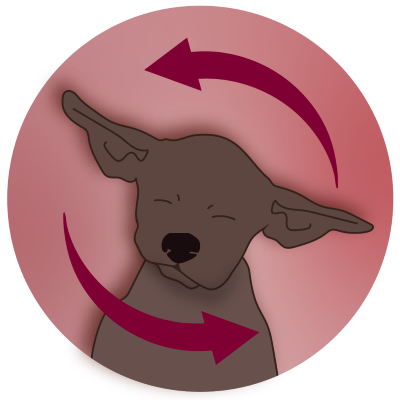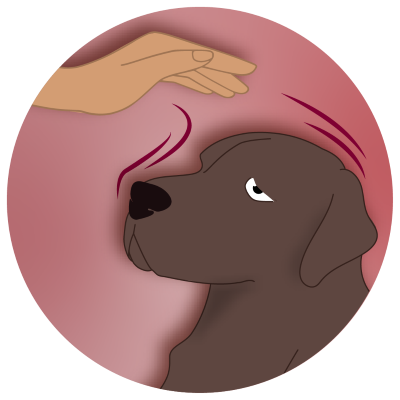What do ear infections in dogs look like?
If you notice your dog acting unusually – exhibiting ear sensitivity or head shaking – they may have an ear infection or ear inflammation, (also known as canine otitis externa).
This inflammation, which affects the ear canal, can be painful for dogs and in most cases will not improve without medical treatment. Plus, dogs that have had it once may be prone to having recurring ear infections.
Untreated or recurring ear infections can lead to permanent changes in the ear canal.
Ear infection symptoms can include:
 Itching & scratching ear
Itching & scratching ear Shaking head
Shaking head Ear smelling bad
Ear smelling bad
 Reddened, sore ear
Reddened, sore ear Reluctance to have ears touched
Reluctance to have ears touched Discharge from ear
Discharge from ear
What should you do if you think your dog has an ear infection?
If you think your pet is suffering from an ear infection, making an appointment with your vet is essential for your dog's recovery.
During your visit, your vet will examine inside your dog's ear to understand what is causing the pain. They might also take a sample from the ear to identify the type of infection.
Your vet may recommend anti-inflammatories to reduce the pain & swelling, ear cleaning or medicated ear drops which can either be given at home or applied by your vet.
What are the treatment options?
Treatment options for ear infections may include:
- Ear cleaners to remove dirt & debris from the ear
- Anti-inflammatories to reduce pain & swelling
- Antibiotics & antifungals, when these are needed
Ear treatments vary in how they are administered:
- One dose ear treatments applied by your vet
- Multi-dose ear treatments applied by your vet
- Once daily ear treatments applied at home
- Twice daily ear treatments applied at home
If your dog is showing signs of an ear infection, make sure to visit your vet & ask about all the available treatment options
Want to know more?

Ear infections in dogs
What you need to know about otitis externa and ear infections in dogs.

Four reasons dog keep shaking their heads
Learn more about four common medical reasons your dog might be shaking their head frequently.

Why does my dog keep getting ear infections?
Repeat ear infections, or chronic otitis externa, can be sore and itchy for your dog.
* Ear infections are very common, and affect up to one in five dogs - Paterson S et al. Companion Animal 2021 26:Sup3, S1-S16
Breed related statistics - O’Neill DG, McMillan KM, Church DB, Brodbelt DC (2023). PLoS ONE 18(7): e0288081.Link: https://journals.plos.org/plosone/article?id=10.1371/journal.pone.0288081#sec007
Over half of UK dog owners struggle to administer daily ear drops for otitis externa - Dog Owner Compliance Evaluation, June 2019
